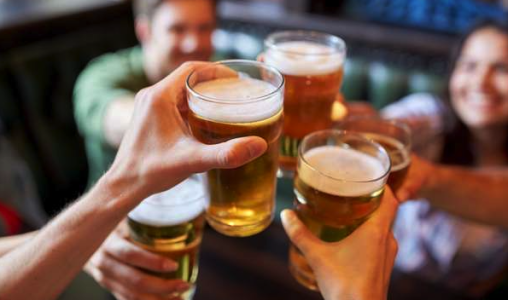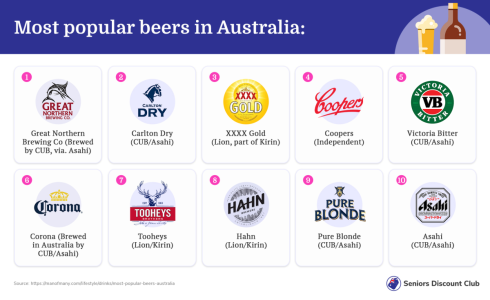Craft brewers cry foul as overseas giants dominate Australian pubs
- Replies 16
It’s something as Aussie as Bunnings snags or summer barbies: supporting local products and businesses.
Local products can offer numerous advantages over imports, making them the preferred choice for some consumers. First and foremost, they play a pivotal role in bolstering the local economy by creating jobs.
Local products also tend to be more environmentally friendly due to their smaller carbon footprint, primarily because they require less transportation to reach the market.
In addition to these economic and ecological benefits, consumers often appreciate the superior quality and freshness of locally sourced goods. These products are typically crafted with meticulous attention to detail and a commitment to craftsmanship.
However, despite these clear advantages, local products don't always dominate every industry.
A recent example is the plight of craft brewers in Australia, who claim to be shut out of the market in pubs nationwide.
This situation is attributed to what they describe as a 'monopoly' held by Japanese conglomerates, who own nine out of the top ten best-selling beers in the country.

Philter, a Sydney-based brewery in the inner-western suburb of Marrickville, is among many independent Australian brewers urging the Australian Competition and Consumer Commission (ACCC) to investigate the market and potentially break up the alleged monopoly.
According to Mick Neil, Co-Founder of Philter, popular brands owned by Japanese companies—Carlton & United Breweries (CUB) and Lion Nathan—dominate pub taps, severely limiting the variety available to drinkers.
Out of Australia's top 10 best-selling beers, five are owned by Asahi (Great Northern, Carlton Dry, VB, Pure Blonde, and Asahi), while four belong to Kirin (XXXX, Corona, Toohey, and Hahn).
The sole Australian-owned beer on the list is Coopers, based in Adelaide.
What's concerning is that all the profits from these massively popular brands are flowing overseas, as both Asahi and Kirin are Japanese companies.
The statistics are alarming when you consider that, out of the whopping $22 billion spent annually on beer in Australia, only 7 per cent goes to independent brewers.
With the rapid increase in independent breweries since the pandemic, craft brewers are grappling with significant challenges to maintain sustainable costs.
According to Neil, their 'fair share' of sales is being overlooked, resulting in employment and income issues nationwide.
'Indie breweries employ 50 per cent of all workers in the beer industry but receive only seven per cent of sales,' he said.
He suggested that consumers choose Australian-made beer to support their local community and keep more profit within the region instead of opting for beer owned by a company based in Japan (or a similar country).
Take Philter, for example, where 30 people are employed, all living within walking distance of the brewery.
Neil emphasised that Australia's breweries have been contending for a fair share of pub sales for decades due to traditional contracts large brewers often have with pub owners. These contracts exclude independent craft brewers from gaining similar influence and support.
He believes that if these tactics are accurate, they may constitute anti-competitive behaviour and should be addressed or eradicated through appropriate legislation.
But the Brewers Association of Australia (BAA), whose members include industry giants like CUB, Lion Nathan, and Coopers, seems to see no cause for concern.
According to BAA's CEO, John Preston, the craft beer industry has experienced remarkable growth over the past 15 years, with independent beer's market share increasing sevenfold during this period.
However, Neil contended that much of this growth has been driven by bottle stores rather than pubs, which he argues should be the primary focus for small brewers.
The pub prices make it considerably easier for drinkers to explore various beer options than purchasing larger quantities from a bottle shop.
'It's easier and cheaper to try a new beer at $9 or $10 a schooner instead of having to buy a six-pack or larger amount for a lot more money,' Neil explained.
He doubted whether pubs can offer drinkers the same level of choice under the current system.
Both suppliers and independents are taking a stance on the issue, with Lion Nathan noting that pubs 'are in the business of giving their customers what they want'.
Meanwhile, a spokesperson from Asahi said publicans make independent craft beers available on tap 'in the overwhelming majority of their venues'.
Neil believes the system is still lagging and is pushing for drinkers to become more observant and be able to spot the difference between a foreign-owned beer and an Australian-made one.
'If you want to support your local community and brewing jobs while also keeping the profits you spend on beer in your local area, then buy a locally-made beer', he said.

Members, what are your thoughts on this news? Do you also prefer locally-made drinks at the pub, or do you not mind opting for brands controlled by Japanese entities? Let us know in the comments below what you think!
Local products can offer numerous advantages over imports, making them the preferred choice for some consumers. First and foremost, they play a pivotal role in bolstering the local economy by creating jobs.
Local products also tend to be more environmentally friendly due to their smaller carbon footprint, primarily because they require less transportation to reach the market.
In addition to these economic and ecological benefits, consumers often appreciate the superior quality and freshness of locally sourced goods. These products are typically crafted with meticulous attention to detail and a commitment to craftsmanship.
However, despite these clear advantages, local products don't always dominate every industry.
A recent example is the plight of craft brewers in Australia, who claim to be shut out of the market in pubs nationwide.
This situation is attributed to what they describe as a 'monopoly' held by Japanese conglomerates, who own nine out of the top ten best-selling beers in the country.

Australian craft brewers claim Japanese giants, which own nine of our top 10 selling beers, have 'locked them out' of reaching drinkers at pubs across the country. Credit: Shutterstock.
Philter, a Sydney-based brewery in the inner-western suburb of Marrickville, is among many independent Australian brewers urging the Australian Competition and Consumer Commission (ACCC) to investigate the market and potentially break up the alleged monopoly.
According to Mick Neil, Co-Founder of Philter, popular brands owned by Japanese companies—Carlton & United Breweries (CUB) and Lion Nathan—dominate pub taps, severely limiting the variety available to drinkers.
Out of Australia's top 10 best-selling beers, five are owned by Asahi (Great Northern, Carlton Dry, VB, Pure Blonde, and Asahi), while four belong to Kirin (XXXX, Corona, Toohey, and Hahn).
The sole Australian-owned beer on the list is Coopers, based in Adelaide.
What's concerning is that all the profits from these massively popular brands are flowing overseas, as both Asahi and Kirin are Japanese companies.
The statistics are alarming when you consider that, out of the whopping $22 billion spent annually on beer in Australia, only 7 per cent goes to independent brewers.
With the rapid increase in independent breweries since the pandemic, craft brewers are grappling with significant challenges to maintain sustainable costs.
According to Neil, their 'fair share' of sales is being overlooked, resulting in employment and income issues nationwide.
'Indie breweries employ 50 per cent of all workers in the beer industry but receive only seven per cent of sales,' he said.
He suggested that consumers choose Australian-made beer to support their local community and keep more profit within the region instead of opting for beer owned by a company based in Japan (or a similar country).
Take Philter, for example, where 30 people are employed, all living within walking distance of the brewery.
Neil emphasised that Australia's breweries have been contending for a fair share of pub sales for decades due to traditional contracts large brewers often have with pub owners. These contracts exclude independent craft brewers from gaining similar influence and support.
He believes that if these tactics are accurate, they may constitute anti-competitive behaviour and should be addressed or eradicated through appropriate legislation.
But the Brewers Association of Australia (BAA), whose members include industry giants like CUB, Lion Nathan, and Coopers, seems to see no cause for concern.
According to BAA's CEO, John Preston, the craft beer industry has experienced remarkable growth over the past 15 years, with independent beer's market share increasing sevenfold during this period.
However, Neil contended that much of this growth has been driven by bottle stores rather than pubs, which he argues should be the primary focus for small brewers.
The pub prices make it considerably easier for drinkers to explore various beer options than purchasing larger quantities from a bottle shop.
'It's easier and cheaper to try a new beer at $9 or $10 a schooner instead of having to buy a six-pack or larger amount for a lot more money,' Neil explained.
He doubted whether pubs can offer drinkers the same level of choice under the current system.
Both suppliers and independents are taking a stance on the issue, with Lion Nathan noting that pubs 'are in the business of giving their customers what they want'.
Meanwhile, a spokesperson from Asahi said publicans make independent craft beers available on tap 'in the overwhelming majority of their venues'.
Neil believes the system is still lagging and is pushing for drinkers to become more observant and be able to spot the difference between a foreign-owned beer and an Australian-made one.
'If you want to support your local community and brewing jobs while also keeping the profits you spend on beer in your local area, then buy a locally-made beer', he said.
Key Takeaways
- Australian craft brewers allege that Japanese brewing giants Asahi and Kirin, which own nine of Australia's top 10 selling beers, have established a 'monopoly' by locking out smaller breweries from pubs.
- Sydney-based brewery Philter has called for the Australian Competition and Consumer Commission (ACCC) to investigate this claimed monopoly.
- Despite a surge in independent breweries, they only account for 7 per cent of total annual beer sales in Australia, worth an estimated $22 billion.
- Philter Co-Founder Mick Neil believes the current system, which has large breweries buying contracts for most taps in any given pub, needs to change to promote Australian products and keep profits domestically.
Members, what are your thoughts on this news? Do you also prefer locally-made drinks at the pub, or do you not mind opting for brands controlled by Japanese entities? Let us know in the comments below what you think!








